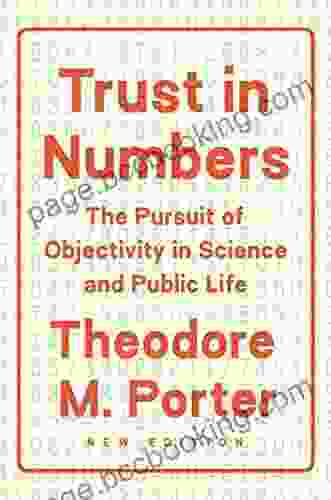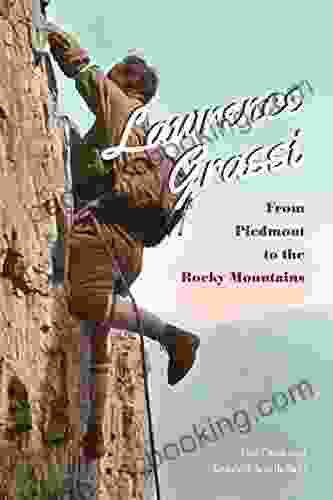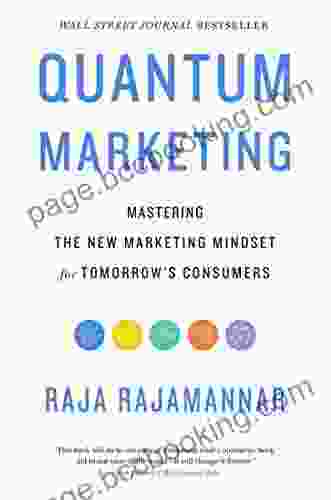The Pursuit of Objectivity in Science and Public Life

Chapter 1: The Elusive Ideal of Objectivity
We live in an era where the pursuit of objectivity has become paramount, yet its true nature remains elusive. In science, objectivity is often seen as the cornerstone of reliable knowledge, a way to transcend personal biases and arrive at universal truths. In public life, objectivity is invoked as a guiding principle for making informed decisions and fostering constructive dialogue.
However, achieving objectivity is far more challenging than it seems. Our perceptions are inherently subjective, shaped by our experiences, beliefs, and emotions. Even in the realm of science, where rigorous methods and empirical evidence are employed, the interpretation of data is often influenced by theoretical frameworks and personal biases.
4.4 out of 5
| Language | : | English |
| File size | : | 1916 KB |
| Text-to-Speech | : | Enabled |
| Screen Reader | : | Supported |
| Enhanced typesetting | : | Enabled |
| Word Wise | : | Enabled |
| Print length | : | 325 pages |
Chapter 2: Bias and Its Disguises
Bias, the tendency to favor one perspective over others, is a pervasive force in human cognition. It manifests in subtle and overt ways, often operating below the level of conscious awareness. Confirmation bias leads us to seek out information that supports our existing beliefs, while ignoring or downplaying evidence that contradicts them. Groupthink can cause individuals to conform to the prevailing opinions within their social circles, suppressing dissenting views.
Recognizing and addressing our biases is crucial for striving towards objectivity. This involves self-reflection, being open to alternative viewpoints, and seeking diverse perspectives.
Chapter 3: The Role of Interpretation
Interpretation plays a central role in both science and public life. In science, data is not self-explanatory; it requires interpretation to make sense of it. This process is influenced by the researcher's theoretical framework, prior knowledge, and personal experiences. Similarly, in public discourse, we interpret events and information based on our values, beliefs, and cultural background.
Understanding the role of interpretation is essential for critically evaluating information and engaging in meaningful discussions. It allows us to recognize that different interpretations are possible and that no single perspective holds a monopoly on truth.
Chapter 4: Navigating Complexity
The world we live in is inherently complex, characterized by interconnected systems and multifaceted issues. Reducing complex phenomena to simplistic narratives or polarizing debates can hinder our ability to understand and address them effectively.
Embracing complexity means acknowledging the interconnectedness of things, recognizing multiple perspectives, and valuing nuance. It requires us to think critically, consider different viewpoints, and seek out a broader understanding of the world around us.
Chapter 5: The Challenges of Modern Discourse
In the digital age, we are constantly bombarded with information and opinions from diverse sources. This can be both empowering and overwhelming, making it difficult to navigate the complexities of modern discourse.
Echo chambers and filter bubbles reinforce our existing beliefs, while algorithms and targeted advertising can further narrow our exposure to diverse perspectives. Navigating this landscape requires media literacy, critical thinking skills, and a commitment to seeking out information from reliable and diverse sources.
Chapter 6: Cultivating a Discerning Mind
Cultivating a discerning mind is essential for navigating the complexities of modern life. It involves developing critical thinking skills, embracing intellectual humility, and seeking out diverse perspectives.
Critical thinking involves analyzing information, identifying biases, and evaluating arguments based on evidence and reason. Intellectual humility recognizes the limits of our knowledge and is open to learning from others. Seeking out diverse perspectives exposes us to different viewpoints and challenges our assumptions.
Chapter 7: The Importance of Dialogue
Dialogue is a powerful tool for fostering understanding and bridging divides. It involves engaging with others in respectful and open-minded conversations, even when we disagree.
Effective dialogue requires active listening, empathy, and a willingness to consider alternative viewpoints. It allows us to learn from others, broaden our perspectives, and find common ground.
Chapter 8: The Promise and Pitfalls of Objectivity
Objectivity is a noble pursuit, but it is important to be aware of its limitations. It is unlikely that we can ever fully eliminate biases or achieve a completely impartial perspective. However, striving for objectivity is still worthwhile as it encourages us to be self-reflective, open-minded, and intellectually rigorous.
The pursuit of objectivity is not about suppressing our individuality or adopting a robotic detachment from the world. Rather, it is about cultivating a discerning mind, embracing complexity, and engaging in meaningful dialogue. It is a lifelong journey that requires constant self-reflection, intellectual humility, and a commitment to truth-seeking.
The pursuit of objectivity in science and public life is a complex and ongoing endeavor. It requires recognizing and addressing our biases, understanding the role of interpretation, navigating complexity, and cultivating a discerning mind. In an era characterized by information overload and polarized discourse, the pursuit of objectivity is more important than ever.
Embracing objectivity empowers us to make informed decisions, engage in constructive dialogue, and work towards a more just and equitable society. It is a journey that requires patience, humility, and a deep commitment to truth-seeking.
4.4 out of 5
| Language | : | English |
| File size | : | 1916 KB |
| Text-to-Speech | : | Enabled |
| Screen Reader | : | Supported |
| Enhanced typesetting | : | Enabled |
| Word Wise | : | Enabled |
| Print length | : | 325 pages |
Do you want to contribute by writing guest posts on this blog?
Please contact us and send us a resume of previous articles that you have written.
 Book
Book Novel
Novel Page
Page Chapter
Chapter Text
Text Story
Story Genre
Genre Reader
Reader Library
Library Paperback
Paperback E-book
E-book Magazine
Magazine Newspaper
Newspaper Paragraph
Paragraph Sentence
Sentence Bookmark
Bookmark Shelf
Shelf Glossary
Glossary Bibliography
Bibliography Foreword
Foreword Preface
Preface Synopsis
Synopsis Annotation
Annotation Footnote
Footnote Manuscript
Manuscript Scroll
Scroll Codex
Codex Tome
Tome Bestseller
Bestseller Classics
Classics Library card
Library card Narrative
Narrative Biography
Biography Autobiography
Autobiography Memoir
Memoir Reference
Reference Encyclopedia
Encyclopedia Jeff Galloway
Jeff Galloway Sally Agar
Sally Agar Rick Reilly
Rick Reilly William Lubbeck
William Lubbeck Noah Galloway
Noah Galloway Paul Woods
Paul Woods Philip Smith
Philip Smith Sampson Davis
Sampson Davis Olivia Fox Cabane
Olivia Fox Cabane Samme Chittum
Samme Chittum Philip Jackson
Philip Jackson Timothy Egan
Timothy Egan Perry Marshall
Perry Marshall Skeleton Steve
Skeleton Steve Pascal Hitzler
Pascal Hitzler Nicolas Sellens
Nicolas Sellens Saul Tanpepper
Saul Tanpepper Stephen P Robbins
Stephen P Robbins Vernon Oickle
Vernon Oickle Rita Moreno
Rita Moreno
Light bulbAdvertise smarter! Our strategic ad space ensures maximum exposure. Reserve your spot today!

 Yukio MishimaPrepare for the Technological Tsunami: A Comprehensive Exploration of 'The...
Yukio MishimaPrepare for the Technological Tsunami: A Comprehensive Exploration of 'The...
 Joseph HellerChasing Ozu Shinnosuke Kometani: A Literary Odyssey into the Enigmatic Heart...
Joseph HellerChasing Ozu Shinnosuke Kometani: A Literary Odyssey into the Enigmatic Heart...
 Rodney ParkerThe Complete and Lyrics Of The Musical: A Journey into the Heart of Musical...
Rodney ParkerThe Complete and Lyrics Of The Musical: A Journey into the Heart of Musical...
 Cormac McCarthyUnveiling the Enchanting World of Marielle Clarac in the Captivating Manga...
Cormac McCarthyUnveiling the Enchanting World of Marielle Clarac in the Captivating Manga... Paulo CoelhoFollow ·4k
Paulo CoelhoFollow ·4k Oscar BellFollow ·16.9k
Oscar BellFollow ·16.9k Damon HayesFollow ·19k
Damon HayesFollow ·19k Bryson HayesFollow ·3.1k
Bryson HayesFollow ·3.1k VoltaireFollow ·19.7k
VoltaireFollow ·19.7k Ivan CoxFollow ·13.8k
Ivan CoxFollow ·13.8k Hugh ReedFollow ·6.5k
Hugh ReedFollow ·6.5k José SaramagoFollow ·12.7k
José SaramagoFollow ·12.7k

 Marvin Hayes
Marvin HayesGoverning Law for Law School and Bar Exam Prep: Your...
Unlock the Secrets of...

 Sidney Cox
Sidney CoxUnveiling the Epic Tales of Whiskey, War, and Military...
In the tapestry of history,...

 Victor Turner
Victor TurnerGoverning Law for Law School and Bar Exam Prep: The...
What is Governing...

 Robert Browning
Robert BrowningSterling Test Prep MCAT General Chemistry Practice...
: Embark on Your MCAT General Chemistry...
4.4 out of 5
| Language | : | English |
| File size | : | 1916 KB |
| Text-to-Speech | : | Enabled |
| Screen Reader | : | Supported |
| Enhanced typesetting | : | Enabled |
| Word Wise | : | Enabled |
| Print length | : | 325 pages |








